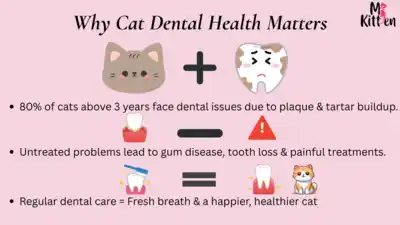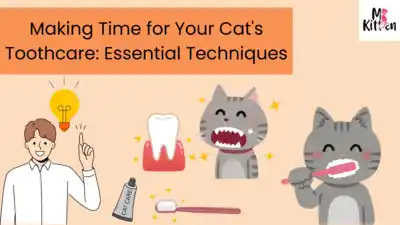Mastering Cat Toothcare: Keeping Your Kitty's Smile Bright
Essential Guide to Cat Dental Health: Preventing Common Oral Issues
Dental problems are a common health issue in cats, with studies suggesting that up to 70% of felines will experience some form of dental disease by the age of three. Regular cat dental health checks and proper feline oral hygiene practices are crucial in preventing these issues.
As a responsible cat owner, prioritizing your kitty’s oral health is essential. This includes not just regular veterinary check-ups but also a proper diet and at-home care. Brushing your cat’s teeth is a simple yet effective way to maintain their oral hygiene and overall health.
This article will guide you through the essential techniques and products for maintaining your cat’s dental health, ensuring their smile stays bright and healthy.
Purrfect Smiles: Keeping Your Cat's Teeth Clean and Healthy
Why Cat Dental Health Matters
Cat dental health is a critical aspect of their overall health that is often overlooked. Cats are prone to various dental problems, including tartar buildup, gum disease, and tooth resorption, which can cause significant discomfort and pain.
Regular dental care is vital to prevent these issues. By incorporating preventive cat dental care into your cat’s routine, you can help ensure their teeth and gums remain healthy. This includes regular veterinary check-ups to identify any potential dental problems early on.
Understanding the importance of cat tooth care and implementing cat dental care tips can significantly improve your cat’s quality of life. By doing so, you can help prevent dental issues and ensure your cat’s overall health and well-being.
Our pet kitties are not capable enough to take care of their dental health. So it becomes a good owner’s responsibility to plan out a toothcare regime for their beloved friend. Teeth and gum issues happen in most kitties beyond three years old. This happens because of that cats unintentionally gather bacteria, plaque and debris majorly from the food they eat. Gradually, this accumulation of germs solidifies and turns into tartar, which harms their gums and in the end cause gum diseases such as gingivitis and tooth loss. In serious cases, the tartar scale can turn out to be outrageous to the point that it’s irreversible, and cats had to be treated to get the teeth or gum removed, which is very painful for your cat.
Also, if your cat is an indoor kitty, such as a Persian cat, you might sense a bad breath or notice plaque in your kitty’s teeth. If you really care about your pet’s oral health then give this article a quick read.
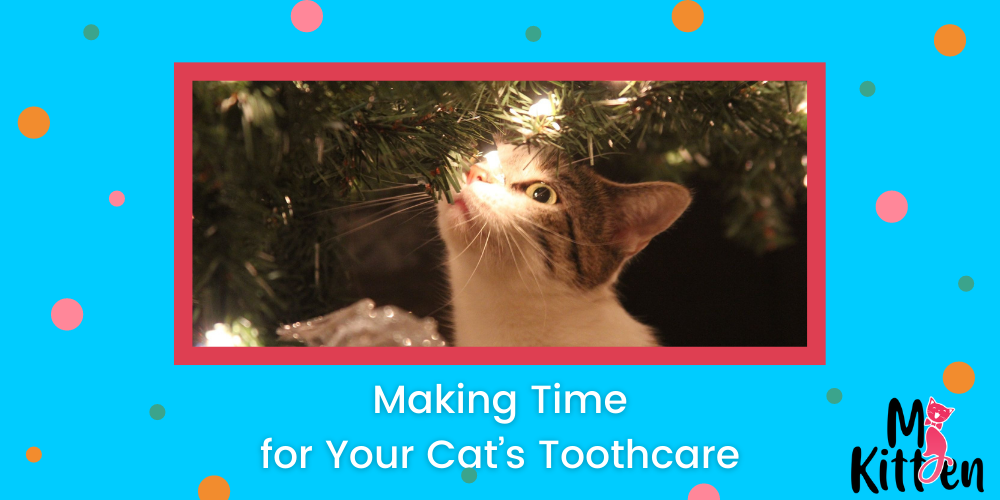
Making Time for Your Cat's Toothcare: Essential Techniques
Brushing your cat’s teeth is a crucial aspect of their overall health and wellbeing. Regular toothbrushing can help prevent dental issues such as tartar buildup, gingivitis, and bad breath.
To start with cat toothbrushing, you’ll need a few essential tools: a cat-specific toothbrush and toothpaste. Human toothpaste is not suitable for cats due to its high fluoride content and foaming agents. Instead, opt for a toothpaste that is specifically formulated for cats and comes in flavors they find palatable.
When introducing toothbrushing to your cat, begin by letting them get accustomed to the toothbrush and toothpaste. Start with small steps, such as gently rubbing their gums with your finger, then gradually introduce the toothbrush. Make the experience positive by rewarding your cat with treats and praise.
Effective at-home cat dental care involves more than just brushing. Regular veterinary check-ups are crucial for maintaining your cat’s oral health. Additionally, providing dental chews or toys can help reduce tartar and plaque.
By incorporating these essential techniques into your cat’s daily routine, you can significantly improve their dental health and overall quality of life. Regular pet teeth cleaning, combined with a balanced diet and regular veterinary care, will keep your cat’s smile bright and healthy.
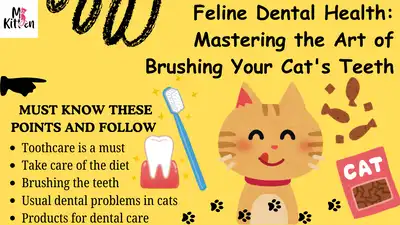
Comprehensive Dental Care Beyond Brushing
A comprehensive approach to feline oral hygiene involves more than just regular brushing. While brushing your cat’s teeth is crucial, it’s equally important to incorporate other dental care products into their routine.
Toothbrushes and toothpastes designed for cats are essential tools in maintaining their oral health. When selecting a toothbrush, look for one with soft bristles and a small head that can easily reach all areas of your cat’s mouth.
Toothbrushes and Toothpastes
Choose a toothpaste that is specifically formulated for cats, as human toothpaste can be harmful to them. Some popular cat toothpastes come in flavors like chicken or fish, making the brushing process more enjoyable for your pet.
- Look for toothpastes with enzymatic action to help break down plaque.
- Select toothbrushes with angled heads for better access.
- Consider using a finger toothbrush for easier handling.
Dental Treats and Toys
Dental treats and toys play a significant role in maintaining your cat’s oral hygiene. These products help reduce tartar buildup and freshen breath.
- Dental chews can help remove plaque and tartar.
- Interactive toys can help reduce stress and promote saliva production, which aids in oral health.
- Choose products that are designed to promote dental health, such as those with ridges or nubs that help clean teeth.
By incorporating these products into your cat’s daily routine, you can significantly improve their oral health and overall well-being.
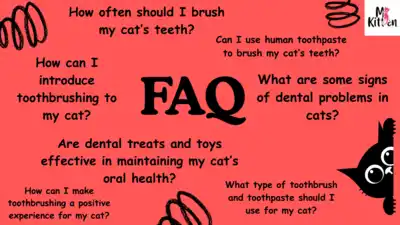
Feline Dental Health: Mastering the Art of Brushing Your Cat's Teeth
Brushing the teeth
This is by far the most useful yet simple method of plaque removal. Just like we humans brush our teeth on a daily basis, same process is required in cats as well. Regular brushing proves to be the best way to prevent oral disease in future. Cats dislike getting their mouth forcefully opened or being brushed. In such cases, you really need to show some patience and at times, please your cat so that they let you carry out the cleaning process. It is recommended that you use a toothbrush with soft bristles and reaches into the difficult to access areas of the mouth. You can avail toothbrush designed for the cat’s mouth at any pet shop. While you brush your cat’s teeth, it is possible that you spot some early traces of plaque or other possible oral disease.
Take care of the diet
Some food is known to get struck into your cat’s teeth and can act as contributor to plaque. On the other hand, there are foods that tend to do the reverse. Dry cat food causes less food crumbles to get struck into the teeth, and is easy to swallow as they do not require much chewing. Veterinarians usually prescribe diet rich in fiber allows less motion of the teeth. Such food with least requirement for chewing helps prevent plaque and easily slide down the mouth, leaving no particles behind.
Usual dental problems in cats
Cats tend to develop periodontal disease, known as an irritation in tissues around the teeth, is a well-known dental issue experienced in veterinary practice. It is brought about by plaque, a clingy bacteria covering on the outside of the tooth, and by the body’s reaction to those microscopic organisms. As the immune system deals with the plaque, the gums become inflamed. This in turn, results into gum disease, the initial phase of periodontal infection. As the irritation advances, the subsequent stage — periodontitis — happens. Periodontitis influences the hard tissues as well as the delicate tissues, and cats may come across destroyed gums and bone removal. After some time, plaque turns into tartar that requires removal by a doctor.
Products for dental care
Most of the cats find it uneasy when someone tries to open their mouth or brush their teeth. Instead of causing pressure on your cat, fix an appointment with your vet and discuss about different items you can bring into use, for example, oral cleanliness gels. Such products contain proteins that prevent bacteria and germs that are known to cause plaque. You can use these gels for your cats or blend them in with their meals.
One can also opt for chewable dental cleans for their cats, or start using dry food in their meals as they contain fiber that takes off plaque and other crumbles on the teeth surface. Usually cats tend to enjoy playing with bite able toys, and these can help reduce the development of plaque however it is recommended that you don’t totally depend on them – the best dental consideration is to provide your cat with regular brushing and improvising cat diet.
It’s a smart idea to provide your indoor cat’s oral and dental care a concern so that your cat’s mouth and teeth appear healthy and fine other the course of time. With persistence and constancy most cats will be able to get prepared about getting their teeth cleaned, regardless of whether it’s brushing their teeth or cleanliness gels.
Toothcare is a must
Dental illness can pose an incredible misery your feline. By dealing with teeth of your cat or any of the different cat breeds, you’re helping care for its overall wellbeing. Ordinary veterinary tests will help identify oral issues in their beginning periods, and reliable home considerations will assist with keeping up great dental wellbeing.
If you notice your cat developing pain the teeth or gums, traces of tartar, gum disease such as red gums, or in the event that you notice a bad breath originating from your cat’s mouth, contact your veterinarian. This demonstrates your feline’s teeth ought to be expertly cleaned before you start with the home-care regime. Talk about your cat’s teeth and oral human services with your veterinarian at each visit.
With regards to feline dental consideration, some human mediation is unquestionably required. Luckily, it’s anything but difficult to find a way to deal with your feline’s mouth, as long as you get them used to having their teeth cleaned right off the bat throughout everyday life. Your veterinarian will likewise have the option to suggest and give you an assortment of items that will keep their teeth and gums fit as a fiddle and perform yearly expert cleaning to forestall the beginning of dental infection.
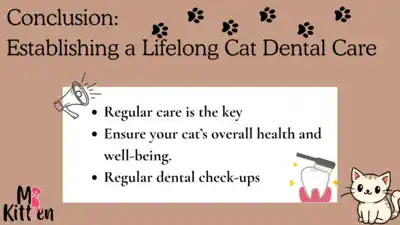
FAQ
How often should I brush my cat’s teeth?
What type of toothbrush and toothpaste should I use for my cat?
Can I use human toothpaste to brush my cat’s teeth?
How can I introduce toothbrushing to my cat?
What are some signs of dental problems in cats?
How can I make toothbrushing a positive experience for my cat?
Are dental treats and toys effective in maintaining my cat’s oral health?
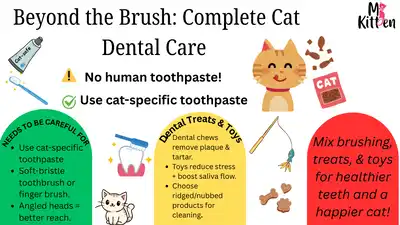
Conclusion: Establishing a Lifelong Dental Care Routine
Maintaining your cat’s dental health is a lifelong commitment that requires regular care and attention. By incorporating cat dental care tips into your daily routine, you can help prevent dental problems and ensure your cat’s overall health and well-being.
Preventive cat dental care is crucial in detecting and addressing dental issues early on. Regular brushing, dental check-ups, and a balanced diet can significantly reduce the risk of dental problems in cats. Understanding the importance of cat tooth care is essential for providing your feline friend with a healthy and happy life.
By following the techniques and tips discussed in this article, you can establish a lifelong dental care routine for your cat. This will not only improve their oral health but also contribute to their overall well-being. Make cat dental care a priority and give your cat the gift of a healthy, happy life.
